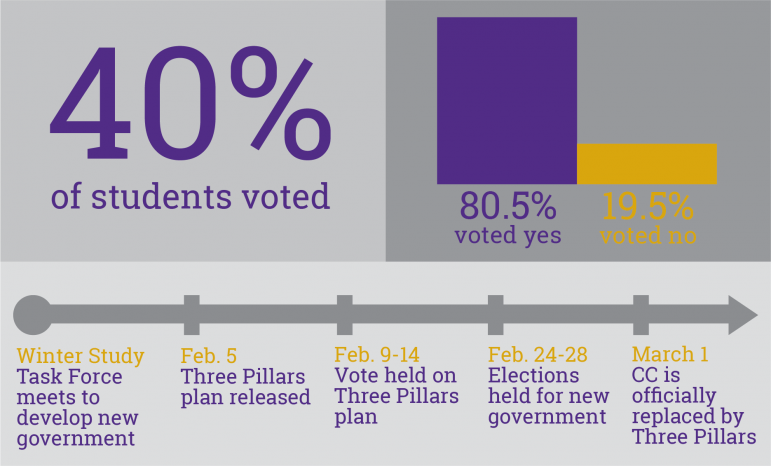
In a campus-wide referendum last week, the student body voted to abolish College Council (CC) and institute the Three Pillars Plan as recommended by the Task Force on Student Governance.
Polls opened on Feb. 9 and closed on Feb. 14. Voter turnout was 40 percent, with 699 students (80.5 percent) voting to abolish CC, far surpassing the simple majority requirement and paving the way for the Task Force to go forward with elections to fill positions as required for the Three Pillars model. Turnout for the referendum was higher than in recent CC elections, which had 26 percent turnout in fall 2019 and 21 percent turnout in fall 2018.
“The vote was the victory that I, and many other people, have been working towards for the past six months,” said Task Force Chair Adly Templeton ’20.
Beginning on March 1, student government will consist of three “pillars,” each charged with a distinct responsibility. The Facilitators for Allocating Student Taxes (FAST), the funding body, will oversee and approve of budget allocations for registered student organizations; The Advisory Board for Lobbying and Elections (TABLE) will be composed of chairs of student-faculty committees; and the Williams Student Union will serve as an advocacy group for students, but is subject to dissolution in the spring of 2021 following a student referendum.
The Three Pillars will replace CC, which has received public scrutiny over the past year for its lack of student participation in elections; its bylaws, which were criticized as outdated and convoluted; its hesitance to fund Black Previews, or affinity programming for black students admitted to the class of 2023; and its decision not to grant registered student organization status to the Williams Initiative for Israel.
The referendum result comes after the student-elected 16-member Task Force created a proposal that redesigned the College’s student government over the course of Winter Study. The Task Force spent the first two weeks of the spring semester raising awareness about the Three Pillars through a town hall session, emails sent to the student listserv and promotional posters. Adam Jones ’21, one of the members of the Task Force, estimated that the Task Force collectively spent over 800 hours restructuring CC.
The Task Force opened a self-nomination solicitation period for five FAST Funding Facilitators and three students from each class to comprise the Williams Student Union, the advocacy group. Elections will run from Feb. 24 until Feb. 28; on Feb. 27, students can meet the candidates at Pub Night as part of the Task Force Transition Plan to fill the new positions under the Pillars model. Elections will be held using the software purchased by the College and conducted under the supervision of the Task Force chair with the help of the outgoing CC co-Presidents, Carlos Cabrera-Lomelí ’20 and Ellie Sherman ’20.
In an email sent to the student body on Feb. 14 announcing the results, Templeton thanked the College community for voting on the referendum. “You voted for a radical new vision that puts equity at the forefront of governance,” she said.
Cabrera-Lomelí said he was “joyful” after hearing the news. “There is a weight off of my shoulders, off of [Sherman’s] shoulders, off of the Task Force…. The power is back in the hands of students, not in a room with [select] students.”
Jones said that he is confident that the model is a necessary and positive step towards just student governance.
Rebecca Park ’22, another Task Force member, said that increased voter turnout “signals a growing student interest in advocating for themselves through voting. I hope that this trend continues to cultivate a culture of voting, not only for College issues but for national issues as well.”
Park said she believes that the Plan provides a “structure that is able to adapt for student concerns and needs,” and encouraged students to “be involved in the growth and development of our structure of student government at Williams, namely by submitting self-noms and serving on these bodies as representatives. I hope that future members of the respective bodies take time to consider and reflect upon the bylaws, amending them as needed to better the governance of their responsibilities.”
Jacob Rhode ’22, who was among the students who voted to abolish CC, said, “I hope that [the new government is] open to changing with the needs of the school and accounting for the fact that the Williams Student Union might not work out.”
Alex Quizon ’21 said he does not have strong feelings regarding the referendum results. Nevertheless, he said he looks forward to a new era of student governance more broadly at the College.
“It’s always been ambiguous — the influence [student government] has and I know there has been a lot of controversy and issues with the financial side of things,” Quizon said. “Until there’s more transparency and it’s [clear] how student government impacts clubs and all of these things, I really won’t know and won’t actively engage in talking about student governance.”
Ryan Pruss ’20 concurred, particularly about the need for increased financial transparency.
The Pillars should be “more transparent to the total student population in where the money is being allocated and to whom it’s being allocated,” Pruss said. “I think transparency is important.”








